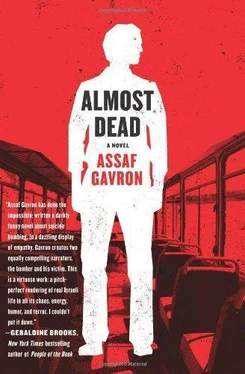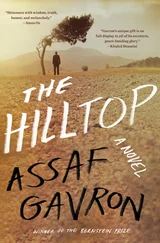I met Dayek after about an hour of fast walking. He stood in the middle of the path, looked at me with his big brown eyes, and batted his long grey eyelashes. His grey hair was soft to the touch, although he was so thin his ribcage was visible. We had a donkey when we were children, and it was thanks to him I’d come to know all the paths around Murair, which, give or take a few dirt ramps, haven’t changed since the days of the prophets. I knew what it was like, riding on the back of a donkey, the pain that grows in your back, and in your spread legs, until you have to move both of them to one side for a while. I remembered the feeling of the boy discovering the big world outside of his village, with the assistance of his first mode of transport. There were a few bicycles around, and now there are more, but a donkey was a luxury when we were kids.
When I left the village, I could have turned in any direction — east, down the cliffs, to the Jordan Valley. North, to the villages on the ridge and farther on to Nablus. Back south, towards Ramallah. All of these options I knew well, but I had no idea which to choose. I turned north, on the assumption that if Bilahl had been caught in Ramallah, it was best to get as far away from there as possible. The donkey accepted my choice humbly. We called the donkey we had in my childhood Nasech, because he was fat. This one had thin legs, and his backbone was protruding and quite painful to my backside. So I called him Dayek, meaning narrow.
In the first village we went through, we stopped in the grocery store and I bought water, pita bread and cheese, and a kilo of carrots for Dayek, who devoured them hungrily. I don’t know why I went for carrots — donkeys are happy with grass or hay, or can even make a meal of bushes and the bark of trees. But I decided to give him a treat. I ended up staying with Dayek a whole week, and I’m convinced that by the end of the week his weight had gone up by several kilos. At any rate, the bones on his back and ribs weren’t sticking out so much. His fur had thickened and looked healthier. I was proud of myself — at least I had made one Palestinian donkey happy.
Dayek had a crooked tooth in the front of his mouth, which gave him character: when he exposed his teeth, the crooked one gave the impression that he was smiling. I smiled back at him and patted his nose, between the ears and eyes. We headed up to the hills. For hours we didn’t see a living thing besides a few birds and a couple of wandering goats; we heard only the sound of the cicadas. We stopped near a cave with a flat area of dirt in front of it. It was starting to get dark and I decided to sleep there. I took out the food and water I had left. ‘The hills of Palestine,’ I told Dayek, ‘are the most beautiful place on Earth. You should realise how lucky you are to be able to spend your life here.’ I put another carrot in his mouth and he chewed it loudly.
Though the days were getting warmer, the nights in the hills were still very cold. Without a blanket I was facing a hard night. But I was also exhausted after a day of travelling, riding a donkey, the excitement of meeting my sister and anxiety about my brother’s and my own destinies. I fell deeply asleep on the cave floor for several hours. The chill woke me long before dawn, even before I heard the muezzins calling from the mosques. Dayek was up and ready for another day on the paths. I descended to a village and, still with help of the dark, took a blanket and a long shirt from a clothes line in a backyard. ‘Support the struggle,’ I whispered in the direction of the house, ‘I’m sure you’ll understand.’ By luck there was a small café there that served hummus and ful to the labourers on their way to work. I ate well and took pita bread and labbaneh with me for the rest of the day. In the grocery I stocked up on water and food for Dayek.
We went on like that during the day, through villages, between the hills, eating, talking. In the middle of the day I heard a muezzin calling for the second prayer, and felt he was talking to me: ‘Come to pray, come to success, Allah is the greatest.’ I went to the mosque and prayed, and at the end of the prayer, I added a personal prayer for Bilahl and Lulu. Although I wasn’t a believer like Bilahl, I liked being in the mosque.
The second night I slept much longer and more comfortably under the blanket. I discovered an old coffee kettle, built a fire and made myself tea with sage and other plants that I collected from the hill around me. I started to feel like Izz ad-Din al-Qassam himself. True, I lit the fire with a lighter rather than sticks or flints, and true, we had the villages for our food, but the feeling of being alone in nature was very powerful. It took hold of me, and got stronger every day, and especially every night that I spent outside, on my own, with only a donkey for company, and a half-moon for light.
But worry about what had happened was gnawing away at me. The next morning I met a shepherd who didn’t have a mobile phone himself but directed me to a grocery in the next village. There I called Halil’s cousin, the driver. She was the only person I could think of. She was surprised to hear from me, asked whether I was OK, told me not to say anything. She was afraid. She asked whether she could call me back in an hour. I got the number from the guy in the store after I’d promised to pay him for receiving a call.
We ate. I didn’t ask where I was. It wasn’t important. A beard was beginning to sketch itself in and my hair was wild. While it was still dark that morning I’d supplied myself with a T-shirt and underwear from the clothes line of some sleeping villagers. On an old tractor I found a baseball cap, with a green plastic net and an adjustable plastic strap at the back. On the front there was white padding and a drawing of a cement mixer with ‘Israbright Cement Factories Ltd’ in Hebrew lettering around it. The shade was green and made from the same padded material. I fell in love with the hat immediately. God knew how much I needed it, how merciless the sun could be.
An hour later she told me what she knew. They’d caught Omar Sharif, she said, who had Bilahl’s number. Bilahl was picked up that same day, she didn’t know where or how. I told her where I was, more or less. I needed to hide well away from the expected places — Al-Amari, Murair, friends, family. She managed a quiet laugh. ‘Like a cowboy,’ she said. ‘Let me try to arrange something. I’ll call this number the same time tomorrow.’
Oh, your fingers, Svetlana…so deep in my back, in my muscles…mmm…Where was I? In the mountains…
What they managed to arrange for me was: a flat in Kafr Qasim. With the blue-card Palestinians, the Israeli citizens. There was a free room in a flat that belonged to one of the supporters of the movement in Gaza. He was renting the flat to a family from the village, just a normal family from Kafr Qasim, who didn’t even know about the Gazan landlord. One room in the flat was rented separately, which saved money for the family. I could stay there for a while, until things cleared up, or the situation eased. ‘How long?’ ‘For the time being you will be there.’ ‘What sort of family is it? I have to live with a family? An Israeli family? To eat with them?’ ‘I don’t have the exact details, but you don’t have many choices, if you don’t want to keep wandering the hills of Nablus on your donkey.’ I was silent. ‘What will I tell them? Where am I supposed to have come from?’ She laughed. ‘You think you’re the only one there? That they wouldn’t recognise the look, the accent? There are plenty of people from the West Bank living in those places.’ ‘How will I get there?’ She was a little impatient. ‘Try to get there on your own. It’s safer. Get there, and start getting organised. Slowly.’ She gave me the address. ‘What about work?’ ‘We’ll see…I’ll ask. But look for work by yourself. The room will be free, by the way. It’s a pretty good deal, Fahmi.’
Читать дальше












